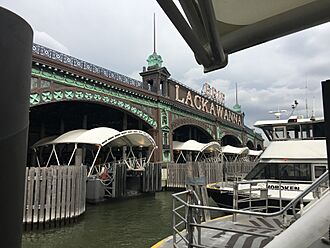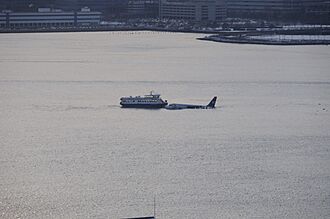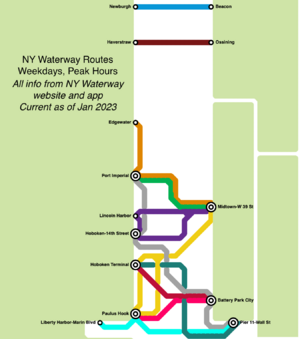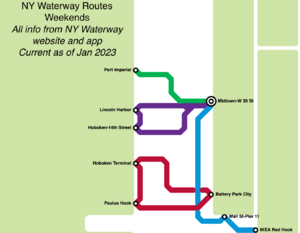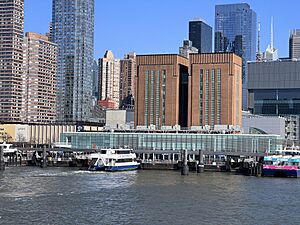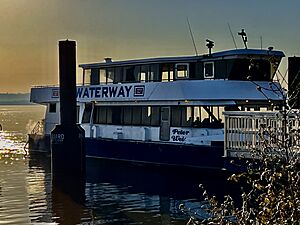NY Waterway facts for kids
 |
|
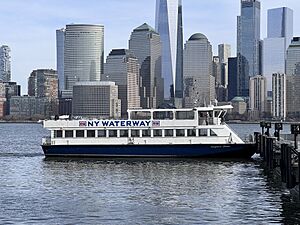
NY Waterway's Empire State ferry at the Paulus Hook terminal in Jersey City, New Jersey in February 2023
|
|
| Locale | New Jersey New York |
|---|---|
| Waterway | Hudson River East River New York Bay |
| Transit type | Passenger ferry Excursions Sightseeing |
| Owner | Port Imperial Ferry Company |
| Began operation | December 3, 1986 |
| No. of lines | 23 |
| No. of vessels | 32 |
| No. of terminals | 18 |
| Daily ridership | 18,148 (weekday average, September 2022) |
NY Waterway, also known as New York Waterway, is a company that runs ferry boats and bus service in the Port of New York and New Jersey area. This includes parts of the Hudson Valley. The company works with government groups like the Port Authority of New York and New Jersey to offer its services. They also help keep the ferry docks in good shape.
NY Waterway uses ferry stops in three places in Manhattan. They also have terminals in Jersey City, Hoboken, Weehawken, and Edgewater. These are all along the Hudson River Waterfront Walkway. They also serve South Amboy in Middlesex County. During busy travel times, they offer service on the Haverstraw–Ossining Ferry and Newburgh–Beacon Ferry. They also go to the Raritan Bayshore. NY Waterway also offers fun trips to places like Yankee Stadium, Gateway National Recreation Area, and Governors Island.
The ferry route from Manhattan to Jersey City is a good way to cross the river. It's an option for people using the East Coast Greenway. This is a long trail for walking and biking. As of November 2019, NY Waterway had a total of 32 boats.
History of NY Waterway
How NY Waterway Started
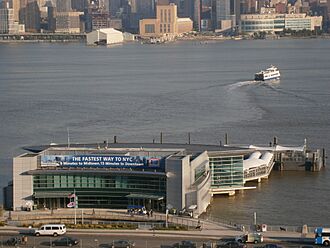
In 1981, a businessman named Arthur Edward Imperatore, Sr. bought a large piece of land. It was about 2.5 miles long along the Weehawken, New Jersey waterfront. He bought it from a company that was going out of business. His idea was to fix up the land and bring back ferry service there.
In 1986, Imperatore started New York Waterway. Their first route went across the river between Weehawken Port Imperial and Pier 78 in Midtown Manhattan. Three years later, they started another route. This one connected Hoboken Terminal and Battery Park City. Over the next ten years, many more routes were added across the Hudson River.
Growth and Challenges
The September 11, 2001 attacks on the World Trade Center caused a lot of damage. The PATH train station there was destroyed. This made it much harder for people to cross the Hudson River. NY Waterway was able to help a lot. They received support to expand their ferry service. They added new routes and more frequent trips. They bought many new boats to do this.
After the PATH train service was fixed, fewer people rode the ferries. This caused financial problems for NY Waterway. By December 2004, there was worry that the ferry service might stop completely. This would affect 30,000 daily riders. To prevent this, a new company called Billybey Ferry Company took over almost half of NY Waterway's boats and routes. The rest of the service stayed with the original company.
East River Ferry Service
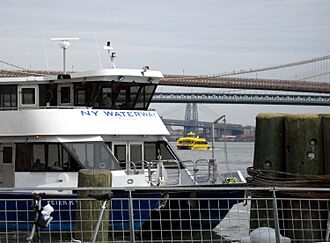
In February 2011, NY Waterway was hired to run a ferry route. This route stopped in Brooklyn and Queens, as well as along the East River. The service started in June 2011. It had seven stops and ran between East 34th Street and Pier 11. It made stops in Queens and Brooklyn. A ticket cost $4 for a one-way trip.
The city of New York helped pay for this service. It was first meant for people going to work. But soon, it became very popular with people on weekends and tourists. Many more passengers used it than the city expected. From June to November 2011, about 2,862 people rode the ferry on an average weekday. On weekends, about 4,500 people rode it. In total, 350,000 people used the ferry during that time. This was much more than the 134,000 riders expected. This route became part of NYC Ferry on May 1, 2017. Another company then took over its operation.
In December 2016, NY Waterway announced it would buy back Billybey Ferry. This brought all the ferry services back under one company.
New Funding in 2023
In 2023, New Jersey received a grant of $11.3 million from the government. This money was for ferries in the state. NY Waterway received $7.298 million from this grant. They used it to change four of their ferries. They converted them from using only diesel fuel to using a hybrid power system.
Rescue Operations by NY Waterway
NY Waterway has helped in many important rescue and emergency situations.
Helping During September 11 Attacks
After the collapse of the World Trade Center, NY Waterway played a huge role. They helped evacuate many people by boat. People were stuck because other ways of transportation were not working. It's estimated that NY Waterway carried over 150,000 people to safety. The Hudson Riverfront 9/11 Memorial is located near an NY Waterway terminal.
Northeast Blackout of 2003
The ferry service also helped people cross the river during the Northeast Blackout of 2003. During this time, trains could not run. They also provided transportation during the 2005 New York City transit strike.
US Airways Flight 1549 Rescue
In January 2009, NY Waterway was very important in rescuing passengers from US Airways Flight 1549. This plane made an emergency landing on the Hudson River after its engines stopped working. The company received a lot of attention for their quick actions. They also gained attention for hiring 19-year-old Brittany Catanzaro as a captain. Thanks to the efforts of Captains Vincent Lombardi and Catanzaro, and their crews, everyone on board the plane was rescued.
Katherine G Tugboat Rescue
On April 6, 2012, a NY Waterway ferry rescued the crew of a tugboat. The tugboat, named Katherine G, had flipped over near Liberty Island. The captain of that ferry, Mohamed Gouda, was also one of the captains who helped rescue people from Flight 1549.
Working with NJ Transit
In June 2012, New Jersey Transit and NY Waterway started a special program. It allowed riders to transfer between the Hudson-Bergen Light Rail and ferries at Port Imperial. This was for people who bought 10-trip or monthly tickets. The program was called Surf and Turf. In May 2013, NY Waterway also started afternoon bus service. These buses followed certain NJ Transit routes. Passengers who bought a special bus-ferry pass could take the bus to the Port Authority Bus Terminal in the mornings. Then they could travel by ferry in the evening.
In December 2014, it was announced that NJ Transit would buy ten buses for NY Waterway to use. In January 2016, NY Waterway and NJ Transit introduced the Hudson GoPass. This pass allowed unlimited travel on light rail, ferries, and certain bus routes. NJ Transit has also helped pay for boat maintenance and new buses.
Ferry Routes and Terminals
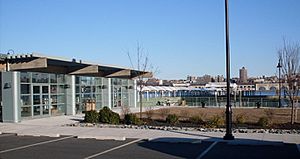
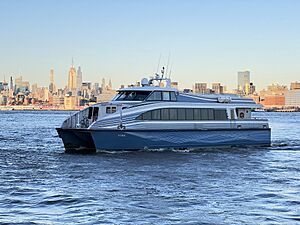
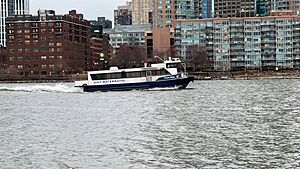
New Jersey to Manhattan Services
Ferry services from New Jersey to Manhattan start in five different areas. These are Edgewater, Weehawken, Hoboken, Jersey City, and South Amboy. Here are the main routes:
| Terminals | Year Began | Notes | |||
|---|---|---|---|---|---|
| Edgewater | Edgewater Ferry Landing | ↔ | Midtown / West 39th Street Pier 79, Midtown |
2006 |
|
| Weehawken | Port Imperial | 1986 | |||
| Pier 11 / Wall Street Financial District |
2000 |
|
|||
| Lincoln Harbor and 14th Street | Midtown / West 39th Street Pier 79, Midtown |
1989 (Lincoln Harbor) | |||
| Hoboken | 2001 (14th Street) | ||||
| Hoboken Terminal | Brookfield Place Battery Park City |
1989 |
|
||
| Pier 11 / Wall Street Financial District |
2001 |
|
|||
| Hoboken Terminal and Paulus Hook | Midtown / West 39th Street Pier 79, Midtown |
2017 (Hoboken Terminal) | |||
| Jersey City | 2001 (Paulus Hook) | ||||
| Paulus Hook Exchange Place |
Brookfield Place Battery Park City |
1994 |
|
||
| Liberty Harbor Marin Boulevard |
Pier 11 / Wall Street Financial District |
2001 |
|
||
| Port Liberté | 1996 |
|
|||
| South Amboy | South Amboy Terminal | Midtown / West 39th Street Pier 79, Midtown |
2023 |
|
|
Ferry Services Within New York City
| Terminals | Year Began | Notes | ||
|---|---|---|---|---|
| Red Hook/IKEA Erie Basin |
↔ | Midtown / West 39th Street Pier 79, Midtown |
2021 |
|
Upstream Hudson River Services
| Terminals | Year Began | Notes | ||
|---|---|---|---|---|
| Haverstraw | ↔ | Ossining Metro-North station |
2000 |
|
| Newburgh | Beacon Metro-North station |
2005 | ||
The Haverstraw–Ossining Ferry connects Haverstraw in Rockland County with Ossining in Westchester County. The Ossining terminal is right next to the Ossining station. This station is served by the Metro-North's Hudson Line train. The Newburgh–Beacon Ferry connects Newburgh in Orange County with Beacon in Dutchess County. The Beacon terminal is also next to the Beacon station, which is on the Hudson Line. Both of these ferries are run by NY Waterway under a contract with the Metropolitan Transportation Authority.
Manhattan Bus Connections
NY Waterway also runs bus services in Manhattan. These buses help ferry passengers get to different places in the city.
Past Services
In the past, NY Waterway also offered ferry service to other places. These included LaGuardia Airport, Newport, Harborside, Liberty State Park, Belford, Sandy Hook, and Belmar, New Jersey. Some of these services, like those to Belford, Sandy Hook, Atlantic Highlands, and Highlands, were later taken over by another company called Seastreak.
See also
- Circle Line Sightseeing
- Liberty Landing Ferry
- Staten Island Ferry
- List of ferries across the Hudson River to New York City
- List of ferries across the East River


